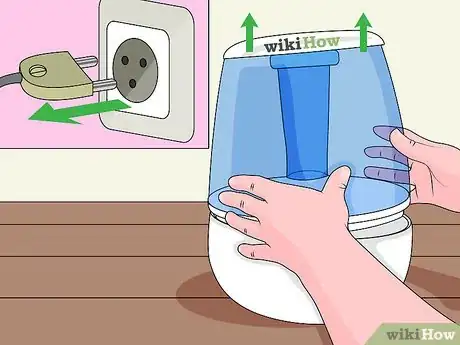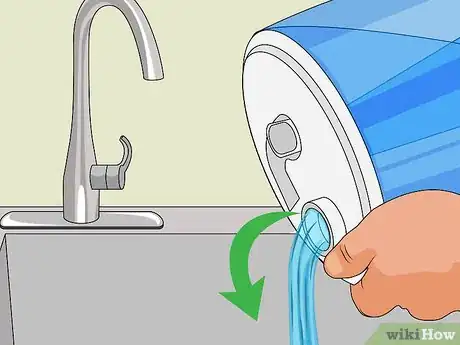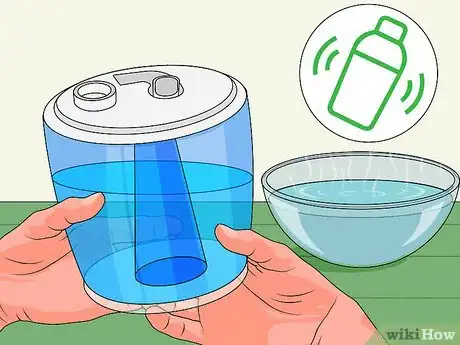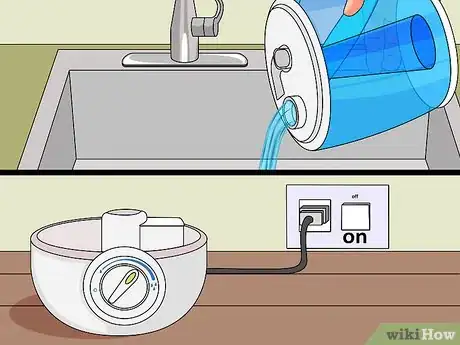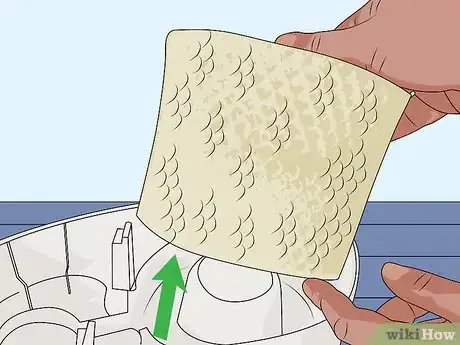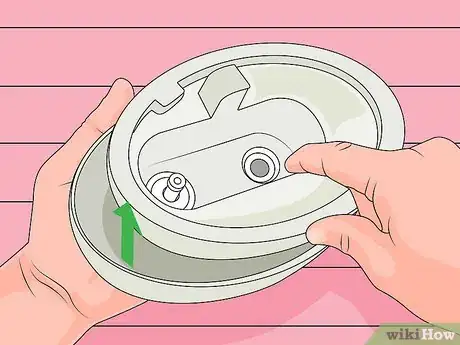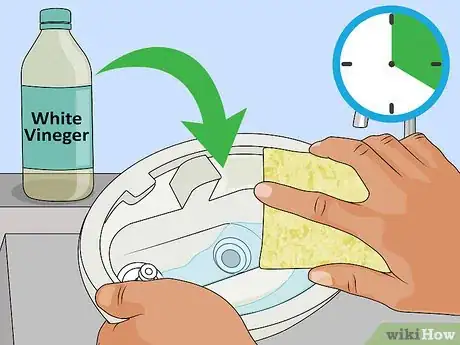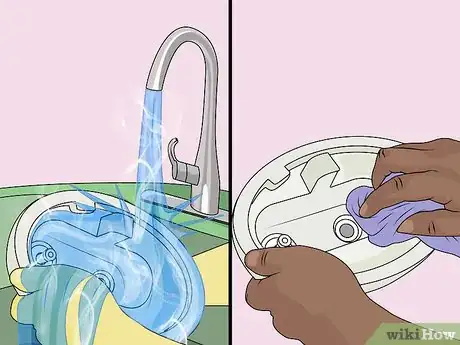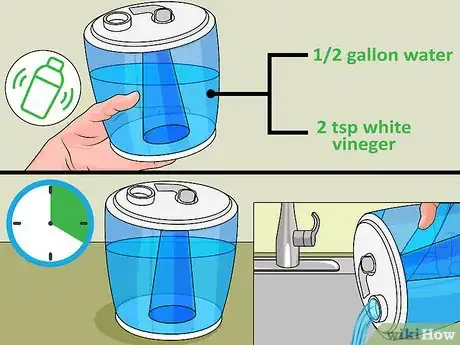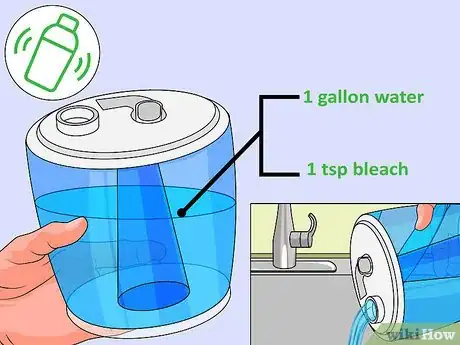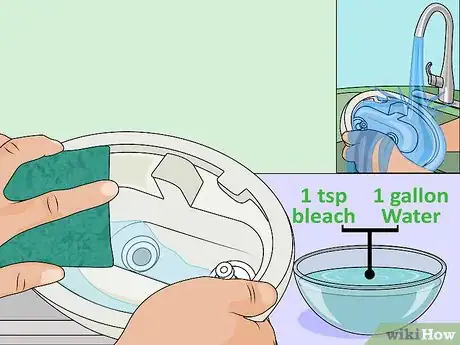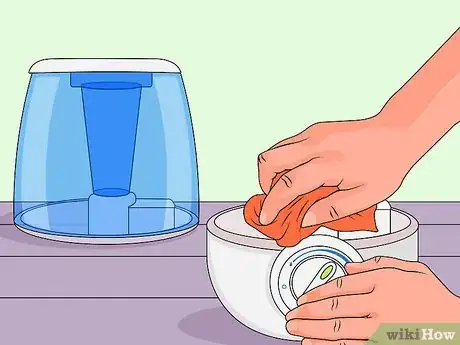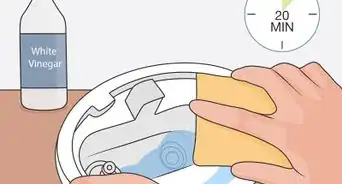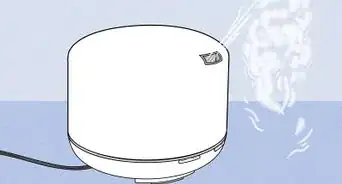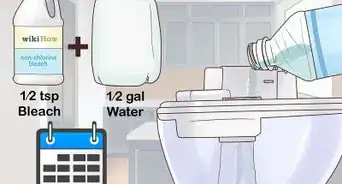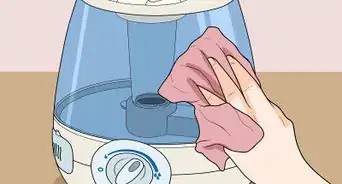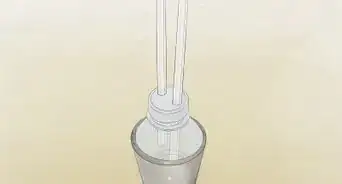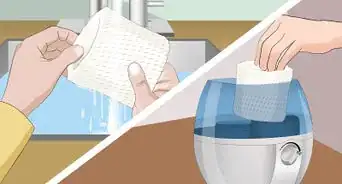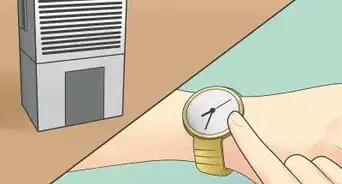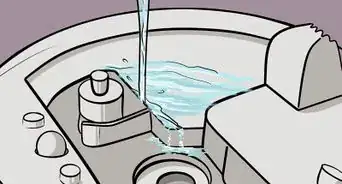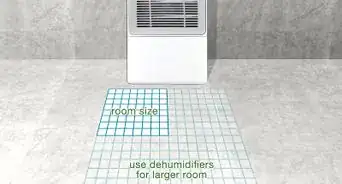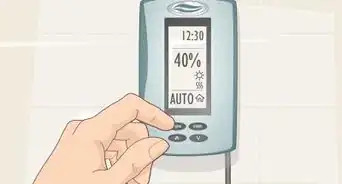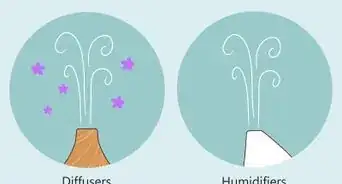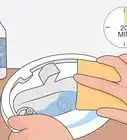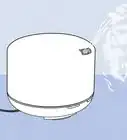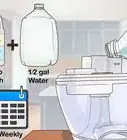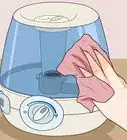This article was co-authored by Victor Belavus. Victor Belavus is an Air Conditioning Specialist and the Owner of 212 HVAC, an air condition repair and installation company based in Brooklyn, New York. In addition to HVAC and air conditioning units, Victor also specializes in furnace repair and air duct cleaning. He has over 10 years of experience working with HVAC systems.
This article has been viewed 83,313 times.
You should clean your cool mist humidifier each day. Empty the water tank, rinse it out, and allow it to dry out a bit before replacing it. More serious cleaning requires removing the scale and disinfecting the unit to prevent the growth of algae, bacteria, and slime. Descale and disinfect your cool mist humidifier at least once each week.
Steps
Conducting Daily Cleaning
-
1Remove the water tank from the base. After turning the device off and removing the cord from the wall, remove the water tank from the base. This can probably be achieved by turning the tank either clockwise or counterclockwise, though the specific method of removal depends on the manufacturer of your cool mist humidifier.[1]
- Consult manufacturer directions for more information regarding how to remove the water tank of your cool mist humidifier.
-
2Empty the water tank. Remove the cap from your cool mist humidifier. Your water tank's cap might snap on or twist off. Dump whatever water remains in the water tank out into your sink or tub.[2]Advertisement
-
3Rinse the tank with lukewarm water. Fill the tank up halfway or more with lukewarm water. Slosh it about inside the tank. Dump the water out into your sink or tub.[3]
- Wipe the tank dry and replace after rinsing.
Removing the Scale
-
1Dry the wicking filter out. Remove and empty the water tank. With the cool mist humidifier switched off, remove the water tank and dump the water out into your sink or tub. Without replacing the water tank, turn the machine on. This will allow the wicking filter to dry out. When you’re done, turn the cool mist humidifier off and unplug it from the electrical outlet.[4]
-
2Remove the wicking filter. The wicking filter is the part of the cool mist humidifier that holds moisture. When dry air moves through the filter, it becomes humidified, and produces vapor.[5] In some cool mist humidifiers, the filter is an open-ended cylinder, while in others it is a flat piece. In either case, it has a sort of spongy, mesh-like appearance.[6]
- You might need to disassemble the cool mist humidifier’s housing to access the filter.
- Handle the filter gently to avoid tearing it.
- The wicking filter removal process will vary depending on what sort of cool mist humidifier you have. Consult manufacturer directions for more information about removing your wicking filter.
-
3Remove the water tray. The water tray is the pool below the cool mist humidifier that the water tank drains into. The water tray might slide out or need to be unclipped from the base of the humidifier.[7]
-
4Clean the water tray with vinegar. Use white vinegar to fill the water tray about halfway. Allow the vinegar to stand for 20 minutes. With the vinegar in the tray, use a sponge dampened slightly with vinegar to wipe the parts of the tray that are not submerged. Be careful not to splash any vinegar on the surface where you’re cleaning the water tray.[8]
- Unless otherwise directed, do not use soap, detergent, or any other type of abrasive cleaner to clean your cool mist humidifier’s water tray. If you do, the cleaner will be aerosolized when you reassemble the humidifier and you’ll end up breathing it in.[9]
-
5Rinse the water tray. After you’ve wiped the water tray down and allowed the vinegar to stand for 20 minutes, rinse it off completely with warm water, or place it in the top shelf of your dishwasher and turn it on. When the tray has been thoroughly rinsed, dry it by hand with a clean, dry dish rag. Set it on your dish rack to allow excess water to evaporate.[10]
- Do not immerse the water tray in water.
-
6Clean the water tank. Fill the water tank with about half a gallon of water and two tablespoons of white vinegar. Replace the cap. Slosh the tank so that the liquid moves around the inside of the tank and coats the walls. Set the tank down and wait 20 minutes. Dump the liquid out and dry the inside with a rag. Air dry to allow remaining liquid to evaporate completely.[11]
Disinfecting the Tank and Tray
-
1Disinfect the water tank. Fill the water tank with one teaspoon bleach and one gallon of water. Replace the cap and shake vigorously once every few minutes for 20 minutes. Empty the liquid from the water tank and refill it with clean water until the smell of bleach is no longer present. Wipe the inside of the water tank and allow to air dry.[12]
-
2Wipe the water tray. Wet a sponge or soft rag with a solution made of one tablespoon of bleach and one gallon of water. Wipe the water tray down with the sponge or rag. When finished, rinse it thoroughly under the sink or place it in the top shelf of your dishwasher and turn the unit on. Allow the water tray to dry before reassembling.[13]
-
3Wipe the outside of the humidifier. Use a clean, damp rag to wipe down the base and outside of the cool mist humidifier. Do not submerge the base in water or you could damage it and risk injury the next time you turned the device on.[14]
Expert Q&A
-
QuestionWhen do I need to use a humidifier?
 Victor BelavusVictor Belavus is an Air Conditioning Specialist and the Owner of 212 HVAC, an air condition repair and installation company based in Brooklyn, New York. In addition to HVAC and air conditioning units, Victor also specializes in furnace repair and air duct cleaning. He has over 10 years of experience working with HVAC systems.
Victor BelavusVictor Belavus is an Air Conditioning Specialist and the Owner of 212 HVAC, an air condition repair and installation company based in Brooklyn, New York. In addition to HVAC and air conditioning units, Victor also specializes in furnace repair and air duct cleaning. He has over 10 years of experience working with HVAC systems.
Air Conditioning Specialist You typically want the humidity in your home to be 40-60%. If you test the air in your home and the humidity is under 40%, you may benefit from using a humidifier.
You typically want the humidity in your home to be 40-60%. If you test the air in your home and the humidity is under 40%, you may benefit from using a humidifier.
References
- ↑ http://vicks.com/en-us/shop-products/humidifiers-steam-inhalers/~/media/Vicks/Images/Products/US/Richtext/V3100%20Vicks%20Cool%20Mist%20Humidifier%20Product%20Manual.pdf
- ↑ http://vicks.com/en-us/shop-products/humidifiers-steam-inhalers/~/media/Vicks/Images/Products/US/Richtext/V3100%20Vicks%20Cool%20Mist%20Humidifier%20Product%20Manual.pdf
- ↑ http://vicks.com/en-us/shop-products/humidifiers-steam-inhalers/~/media/Vicks/Images/Products/US/Richtext/V3100%20Vicks%20Cool%20Mist%20Humidifier%20Product%20Manual.pdf
- ↑ http://vicks.com/en-us/shop-products/humidifiers-steam-inhalers/~/media/Vicks/Images/Products/US/Richtext/V3100%20Vicks%20Cool%20Mist%20Humidifier%20Product%20Manual.pdf
- ↑ http://thesweethome.com/reviews/the-best-humidifier/#risks
- ↑ http://vicks.com/en-us/shop-products/humidifiers-steam-inhalers/~/media/Vicks/Images/Products/US/Richtext/V3100%20Vicks%20Cool%20Mist%20Humidifier%20Product%20Manual.pdf
- ↑ http://vicks.com/en-us/shop-products/humidifiers-steam-inhalers/~/media/Vicks/Images/Products/US/Richtext/V3100%20Vicks%20Cool%20Mist%20Humidifier%20Product%20Manual.pdf
- ↑ Victor Belavus. Air Conditioning Specialist. Expert Interview. 6 May 2020.
- ↑ http://thesweethome.com/reviews/the-best-humidifier/#risks
- ↑ http://vicks.com/en-us/shop-products/humidifiers-steam-inhalers/~/media/Vicks/Images/Products/US/Richtext/V3100%20Vicks%20Cool%20Mist%20Humidifier%20Product%20Manual.pdf
- ↑ Victor Belavus. Air Conditioning Specialist. Expert Interview. 6 May 2020.
- ↑ http://vicks.com/en-us/shop-products/humidifiers-steam-inhalers/~/media/Vicks/Images/Products/US/Richtext/V3100%20Vicks%20Cool%20Mist%20Humidifier%20Product%20Manual.pdf
- ↑ http://vicks.com/en-us/shop-products/humidifiers-steam-inhalers/~/media/Vicks/Images/Products/US/Richtext/V3100%20Vicks%20Cool%20Mist%20Humidifier%20Product%20Manual.pdf
- ↑ http://vicks.com/en-us/shop-products/humidifiers-steam-inhalers/~/media/Vicks/Images/Products/US/Richtext/V3100%20Vicks%20Cool%20Mist%20Humidifier%20Product%20Manual.pdf
